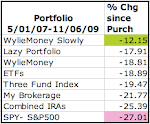
Two funds caught my eye yesterday as they posted serious declines in value (images from cnn.com):
PCOAX Putnam Capital Opportunities;A

PGRWX Putnam Growth & Income;A

So what gives? Many mutual funds make capital gains distributions. Often this is a result of portfolio turnover. Wikipeda explains it like this:
"Turnover generally has tax consequences for a fund, which are passed through to investors. In particular, when selling an investment from its portfolio, a fund may realize a capital gain, which will ultimately be distributed to investors as taxable income."
Someone holding the funds above would not see the total value of their holdings go down by 10% or 11%, assuming they were reinvesting their dividends and capital gains distributions, as the amount of the distribution would buy additional (now cheaper) shares of the fund.
Where this shows up is in the new year, when it comes times to pay taxes. The 10% that was distributed will show up on Form 1099-DIV from your brokerage as a taxable event. So you will owe taxes on the amount distributed.
One way to avoid or lessen the amount of capital gains distributions you receive is to invest in funds that do not sell the stocks they own very frequently- funds with lower turnover. In retirement accounts, IRAs 401(k)s or 403(b)s for example, your holds are not subject to taxes while they are held in the account so you do not pay taxes on these distributions. Kep in mind though that when a fund manager sells a stock, she pays a fee to do so, just like you would, and those fees are also passed on to shareholders so low turnover is good for a variety of reasons, even in tax free or tax deferred accounts.
That said, you will find that different strategies are used in categories- some categories have higher average turnover than others. The key here is not to pick the lowest turnover possible- if the fund is underperforming its peers for example. A better strategy is to pick a well performing fund with a lower than average turnover.
The Putnam Capital Opportunities fund Is a Small Cap Growth fund with 60.27% turnover. This is high, but the average for this category is 110.43% so this is below average. The bigger concern here is the 5.25% sales load. If you bought this fund at the beginning of the year and sold it on October 31st, you might be pleased with your anticipated windfall as the fund was up 13.09% at that point. The average gain for funds in this category was only 7.16%. However, after paying the 5.25% sales load, accounting for 1.20% in expenses and after paying taxes on profit and capital gains, the estimated take home here is 4.65%.

The Putnam Growth and Income fund is a different story with some similar issues. The first issue here is that, despite the name, this fund falls in the Large Cap Value category not the Large Cap Growth category. Funds do drift around and switch categories from time to time, but this fund has been solidly Value for a while:

Why does this matter? You should know what you have. Different sectors go in and out of favor. A lot of analysts think Large growth stocks are due for a run. If you owned this fund, you might think you have your investments poised to take advantage of this trend if it happens. You would be wrong and Putnam should be ashamed for misleading you or better yet, update the name of the fund. Anyway...
The average turnover for Large Cap Value funds is 55.91% and the average for Large Cap Growth is 83.76%. Since this fund is invested in Value stocks its turnover at 52.80% is... average. If you bought this at the beginning of the year and sold it at the end of Oct. you would not walk away with a 10.99% increase- you would take home around 3.34%.

When we choose a Large Cap Value fund for out hypothetical non-retirement account, we'll see if we can find a fund with lower turnover, and hopefully now it is a little more clear why we care!



4 comments:
Definitely clear. I wish my advisor had explained this when I bought PCOAX.
My advisor was with BOA Investments, and I've since left them. They seemed more interested in getting my money and getting me in and out the door than explaining these details to me. When I asked questions, my advisor handed me outdated prospectuses and instructed me to read them on my own time.
I've been paying those taxes for years. Sadness. But I understand those are taxes I will not be assessed when I sell.
bill jones
Good info about tax and all.
Finance Bookmark
Your post really shares a great information and is really help full for investors. Hoping you will be there with more updates on mutual funds. :)
Post a Comment